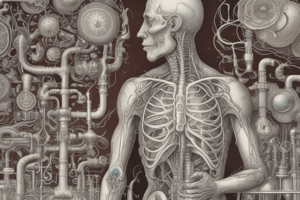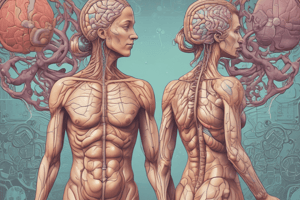Podcast
Questions and Answers
Quel électrolyte est essentiel pour la santé des os, la contraction musculaire et la coagulation sanguine?
Quel électrolyte est essentiel pour la santé des os, la contraction musculaire et la coagulation sanguine?
Quel électrolyte aide à réguler les niveaux de sucre dans le sang et contribue à la santé des os?
Quel électrolyte aide à réguler les niveaux de sucre dans le sang et contribue à la santé des os?
Quel électrolyte contribue à la production d'acide gastrique et à la transmission de l'influx nerveux?
Quel électrolyte contribue à la production d'acide gastrique et à la transmission de l'influx nerveux?
Dans quelle division du corps, les électrolytes sont-ils inégalement répartis en raison de la présence de protéines et d'ions chargés?
Dans quelle division du corps, les électrolytes sont-ils inégalement répartis en raison de la présence de protéines et d'ions chargés?
Signup and view all the answers
Quel électrolyte régule l'équilibre acido-basique et les niveaux de pH sanguin?
Quel électrolyte régule l'équilibre acido-basique et les niveaux de pH sanguin?
Signup and view all the answers
Quel est le plus grand compartiment de fluide dans le corps humain?
Quel est le plus grand compartiment de fluide dans le corps humain?
Signup and view all the answers
Quel déséquilibre électrolytique peut causer des spasmes musculaires, des rythmes cardiaques anormaux et de la confusion mentale?
Quel déséquilibre électrolytique peut causer des spasmes musculaires, des rythmes cardiaques anormaux et de la confusion mentale?
Signup and view all the answers
Quels dispositifs ont été développés pour surveiller les électrolytes dans le corps en temps réel?
Quels dispositifs ont été développés pour surveiller les électrolytes dans le corps en temps réel?
Signup and view all the answers
Quel est l'effet d'un faible niveau de potassium dans le corps?
Quel est l'effet d'un faible niveau de potassium dans le corps?
Signup and view all the answers
Quelle technique est utilisée pour détecter les changements dans les concentrations d'électrolytes en temps réel?
Quelle technique est utilisée pour détecter les changements dans les concentrations d'électrolytes en temps réel?
Signup and view all the answers
Study Notes
Introduction
Electrolytes are ions dissolved in body fluids that help regulate the body's fluid balance, maintain proper pH levels, and transmit electrical impulses throughout the body. Understanding electrolytes in physiology is crucial for maintaining health and treating various medical conditions. This article discusses the role of major electrolytes, their importance in the body, and the effects of alterations in their concentrations.
Major Electrolytes
The key electrolytes in the human body are:
- Sodium (Na+): Regulates fluid balance, helps maintain blood pressure and regulates osmosis.
- Potassium (K+): Facilitates nerve impulse transmission and muscle contraction.
- Calcium (Ca2+): Important for bone health, muscle contraction, and blood clotting.
- Magnesium (Mg2+): Contributes to muscle and nerve function, blood sugar regulation, and bone health.
- Chloride (Cl–): Regulates fluid balance, contributes to nerve impulse transmission, and aids in stomach acid production.
- Hydrogen carbonate (HCO3–): Helps regulate blood pH levels and maintain acid-base balance.
Electrolyte Distribution in the Body
Electrolytes are unevenly distributed in the body fluids, which is crucial for physiological processes. The body is divided into compartments, including intracellular fluid (ICF), extracellular fluid (ECF), and transcellular fluids, which are unevenly distributed due to the presence of charged proteins and ions. The ICF is the largest fluid compartment, while the ECF is composed of plasma and interstitial fluid. Transcellular fluids are not shown in the figure and are a very small percentage of total body fluids.
Effects of Electrolyte Imbalances
Abnormal levels of electrolytes can lead to various health issues. For example, low potassium levels (hypokalemia) can cause muscle weakness and irregular heartbeats, while high sodium levels (hyponatremia) can result in swelling, muscle cramps, and seizures. Hypocalcemia, low calcium levels, can lead to muscle spasms, abnormal heart rhythms, and mental confusion.
Electrolyte Measurement and Monitoring
Electrochemical devices have been developed to monitor ionic analytes for healthcare and industrial applications. These devices use various techniques, such as potentiometry, cyclic voltammetry, and stripping voltammetry, to detect changes in electrolyte concentrations in real-time. These devices can be integrated with energy harvesting electronics, such as triboelectric-powered energy harvesters, to enhance their performance and accuracy.
Conclusion
Electrolytes play a vital role in maintaining the balance of fluids and ions in the body, regulating pH levels, and transmitting electrical impulses. Understanding the distribution, role, and potential imbalances of these electrolytes is essential for maintaining health and treating various medical conditions. Modern technology has enabled the development of electrochemical devices to monitor and measure electrolyte levels, contributing to improved healthcare and research.
Studying That Suits You
Use AI to generate personalized quizzes and flashcards to suit your learning preferences.
Description
Explore the role of major electrolytes in the human body, their importance for maintaining health, and the effects of imbalances. Learn about electrolyte distribution, measurement techniques, and the significance of electrolyte monitoring in healthcare.




